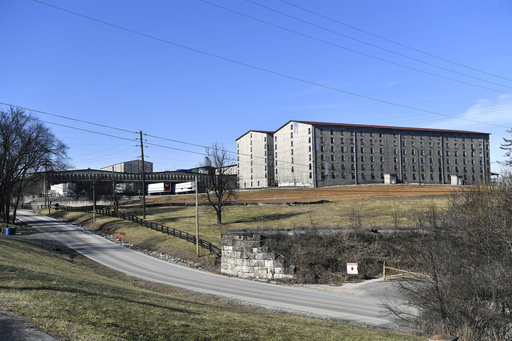
LAWRENCEBURG, Ky. — In the scenic hills of Kentucky, the birthplace of the majority of the world’s bourbon, the looming threat of renewed trade conflicts feels like a lingering headache that might not ease anytime soon.
Kentucky’s bourbon producers are again in a precarious position as President Trump has initiated new tariffs on the U.S.’s northern and southern neighbors, Canada and Mexico. As of Monday, Trump, along with the leaders of these countries, agreed to temporarily suspend the planned tariffs for at least a month while discussions continue. However, this uncertainty still raises alarms among local officials and industry representatives regarding the future of Kentucky’s legendary bourbon.
The export of American whiskey has already been hit hard during an earlier trade clash that occurred in Trump’s first term. Prior to the announcement of the 30-day hold, Canada — a crucial market for American spirits — reacted by imposing tariffs on various American imports, including alcoholic beverages. Some officials in provincial regions even contemplated barring American liquor brands from their government-operated stores.
The bourbon sector contributes approximately $9 billion annually to Kentucky’s economy, fostering job creation and tourism, according to a recent study. Remarkably, Kentucky distillers account for 95% of the worldwide bourbon output, as reported by the Kentucky Distillers’ Association.
The bourbon production industry is core to the economic fabric of Lawrenceburg, a city located close to famed distilleries like Wild Turkey and Four Roses. In a community where support for Trump is strong, some residents express confidence in imposing tariffs as a strategy to secure advantageous negotiations with foreign nations.
“I think it’s time for our nation to stand up for what’s right. That’s exactly what we’re doing now,” commented Lawrenceburg local Gary Chilton while running errands. “Other countries have exploited our trade policies for too long. It’s a tactic for negotiations. It will all work out in the end.”
Meanwhile, Kentucky’s Democratic Governor Andy Beshear, in a video shared on social media Sunday, cautioned that new tariffs could adversely affect working-class families in a state that largely backed Trump in the last election. Beshear highlighted that the repercussions would extend beyond distilleries, affecting various supporting industries including agriculture and barrel manufacturing. Observers believe Beshear could be eyeing a presidential run in 2028.
In contrast, Republican U.S. Representative Andy Barr, whose district includes parts known for bourbon production, maintained his support for Trump amidst the ongoing industry uncertainty. Barr lauded Trump’s approach, suggesting that foreign nations are being reminded of America’s strong position in global trade. “Under this administration, they are realizing that we will not be taken for granted,” he stated. He also affirmed his commitment to uphold the bourbon sector, which he described as a crucial contributor to job creation and economic growth.
On the other hand, Republican U.S. Senator Mitch McConnell expressed reservations on Monday regarding the potential consequences of tariffs on jobs and consumer pricing within the state and beyond. “I advocate for addressing unfair trade practices, but I am not in favor of tariffs,” McConnell stated. “Ultimately, tariffs tend to increase the cost of goods and services for everyone, putting the financial burden on American consumers.”
The bourbon industry remains hopeful that calmer approaches will prevail. The Kentucky Distillers’ Association praised the decision to put tariffs on hold for the time being, noting that both Canada and Mexico have committed to collaborating with Trump to enhance border security and combat drug trafficking.
“We eagerly anticipate long-lasting agreements that will allow Kentucky bourbon to be enjoyed worldwide,” said Eric Gregory, the association’s president, in a statement issued late Monday.
Chris Swonger, the president and CEO of the Distilled Spirits Council of the United States, urged both the U.S. and Canada to reach a mutually beneficial agreement for their respective spirits industries. He pointed out that many producers are currently feeling the effects of these tariffs.
“Some spirits are designated as ‘distinctive products’ by both the U.S. and Canada and can only originate from their respective countries, including bourbon and Tennessee Whiskey from the U.S. and Canadian Whisky from Canada,” Swonger elaborated. “Therefore, the creation of these products cannot simply be relocated to another country or region.”
Even before the latest trade tensions flared up, American whiskey makers were facing challenges owing to substantial inventories of aging whiskey waiting to enter the market. Recent reports show that Kentucky is home to a record 14.3 million barrels of bourbon currently maturing, as per the Kentucky Distillers’ Association. This comes at a time when younger demographics are reportedly consuming less alcohol.
An ominous threat looms from across the Atlantic, where the European Union intends to reintroduce tariffs on American whiskey at a staggering 50% rate come late March, unless immediate actions are taken to prevent it. Trump warned reporters on Sunday that such import taxes are poised to be enacted with the EU and potentially with the United Kingdom as well. The reinstatement of tariffs from a significant export market for American whiskey would create major challenges, as voiced by Swonger.

